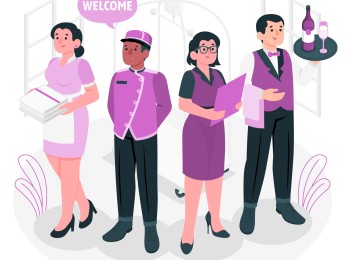Being a personal assistant requires a diverse skill set and a high level of adaptability. First and foremost, effective communication skills are essential, as personal assistants often act as the primary point of contact between their employer and the rest of the world.
Organisational abilities are crucial, as you will be responsible for managing schedules, appointments, and various tasks. You will also need to be proficient in time management to prioritise and coordinate multiple activities efficiently. Technical proficiency is increasingly important too, as personal assistants are often tasked with handling digital communication and using productivity tools.
As a personal assistant or secretary, you will serve as a gatekeeper, managing the flow of information and ensuring the employer's time is utilised optimally. By handling routine tasks, you will allow executives and professionals to focus on high-priority matters, contributing to better decision-making and overall efficiency.
Upon completion of this course, participants will be able to:
- Acquire a comprehensive understanding of the Office Administrator role, adhere to relevant standards, and exhibit professional conduct.
- Organise and coordinate meetings and tasks, prioritise responsibilities, and meet specified deadlines.
- Offer operational assistance to the administrative department.
- Manage schedules, schedule appointments, and make necessary travel and room bookings.
- Prepare and distribute documents for meetings, take accurate minutes, and handle incoming and outgoing mail.
- Create drafts of letters, presentations, and other documents, ensuring clarity and professionalism.
- Establish and maintain efficient filing systems for documents and records to facilitate daily office operations.
- Use interpersonal skills to align with and support the organisation's vision.
- Familiarise yourself with information technologies to enhance communication with stakeholders.
This course is designed for anyone who aims to become a personal assistant for a company or anyone requiring training to enhance their secretarial abilities to increase efficiency. It would be most beneficial for:
- Personal Assistants
- Secretaries
- HR Professionals
- Administrators
- Supervisors
- Senior Administrators
- PR Professionals
- Project Managers
- Payroll Professionals
This course uses a variety of adult learning styles to aid full understanding and comprehension. Participants will listen to trainer-led presentations to understand exactly what it takes to become a successful PA. They will also work through a variety of systems and platforms aimed at increasing productivity and efficiency with planned projects.
Participants will also work through modules to understand the importance of accurate record keeping, GDPR necessities and also conduct practical activities to improve note taking abilities.
Day 5 of each course is reserved for a Q&A session, which may occur off-site. For 10-day courses, this also applies to day 10
Section 1: The Skills of a PA
- The changes in PA requirements in recent years.
- Time management techniques for personal assistants.
- Effective communication strategies in a professional setting.
- Organisation and prioritisation of tasks and responsibilities.
- Mastering calendar management and scheduling.
- Handling confidential information and maintaining discretion.
- Problem-solving and decision-making skills in dynamic work environments.
- Enhancing multitasking abilities for increased productivity.
- Continuous learning and adaptability to evolving work demands.
- Professional etiquette and representing the executive or team effectively.
Section 2: The Best Technology to Increase Productivity
- Proficient use of office productivity tools (e.g., Microsoft Office, Google Workspace).
- Developing strong interpersonal skills for effective collaboration.
- Handling confidential information and maintaining discretion.
- Project management software for efficient planning and execution.
- Advanced communication tools and platforms for seamless collaboration.
- Artificial intelligence and machine learning applications for process optimisation.
- Cybersecurity tools and best practices to ensure data protection.
- Mobile technologies for on-the-go productivity and accessibility.
- Integrating data analytics tools to make informed business decisions.
Section 3: Writing & Documentation
- Templates and document keeping.
- Techniques for proofreading and editing to enhance document quality.
- Creating impactful business reports and proposals.
- Documenting processes and procedures for organisational clarity.
- Incorporating visuals and multimedia for better document engagement.
- Collaborative writing and version control in team environments.
Section 4: Diary Planning
- Prioritising tasks and scheduling appointments efficiently.
- Using digital tools and software for diary management.
- Time-blocking strategies for optimising daily schedules.
- Balancing competing priorities in a dynamic work environment.
- Managing and coordinating meetings, events, and travel arrangements.
Section 5: Incoming and Outgoing Information
- Understanding the implications of GDPR.
- Creating a reliable document management system.
- Prioritising and triaging information based on importance and urgency.
- Effective use of communication tools for managing incoming data.
- Developing systems for quick retrieval and reference of information.
- Strategies for handling sensitive and confidential incoming data.
Section 6: Travel Arrangements
- Finding the best pricing without compromising on appearance.
- Navigating international travel logistics and considerations.
- Managing travel budgets and expenses effectively.
- Handling last-minute changes and unexpected challenges during travel.
- Communicating travel details clearly to executives and team members.
- Incorporating technology for seamless travel coordination.
Upon successful completion of this training course, delegates will be awarded a Holistique Training Certificate of Completion. For those who attend and complete the online training course, a Holistique Training e-Certificate will be provided.
Holistique Training Certificates are accredited by the British Assessment Council (BAC) and The CPD Certification Service (CPD), and are certified under ISO 9001, ISO 21001, and ISO 29993 standards.
CPD credits for this course are granted by our Certificates and will be reflected on the Holistique Training Certificate of Completion. In accordance with the standards of The CPD Certification Service, one CPD credit is awarded per hour of course attendance. A maximum of 50 CPD credits can be claimed for any single course we currently offer.
- Course Code MG1-115
- Course Format Classroom, Online,
- Duration 5 days










